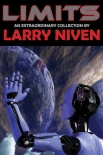Limits, Larry Niven [the best motivational books .TXT] 📗

- Author: Larry Niven
Book online «Limits, Larry Niven [the best motivational books .TXT] 📗». Author Larry Niven
I caught up.
A swing at the head only got the horns. I hammered at the neck, just behind the head. It tumbled, and tried to get to its feet, and I beat it until it fell over. I used the skull like an ax…murdering it…and suddenly black bodies flowed out of the fat grass and tore at the melk. B-beam got a good grip on the horns and snapped the neck.
I sat down.
He handed me the line: knife, beamer, canteen. He was almost as winded as I was. He whispered, “Damn fool, you weren’t—”
“Wrong.” I didn’t have breath for more. I drank from my canteen, paused to gasp, drank again. Then I turned the beamer on a meaty thigh. The Folk must have been waiting for me to make my choice. They now attacked the forequarters.
I crouched, panting, holding the beamer on the meat until it sizzled, until it smoked, until the smell of it told my belly it was ready.
The heaving of my chest had eased. I handed the knife to B-beam. “Carve us some of that. Eat as much as you can. Courtesy to our hosts.”
He did. He gave me a chunk that I needed both hands to hold. It was too hot; I had to juggle it. B-beam said, “You used a weapon.”
“I used a club,” I said. I bit into the meat. Ecstasy! The famine was over. I hadn’t cooked it enough, and so what? I swallowed enough to clear my mouth and said, “Humans don’t use teeth and claws. The Folk know that. They wanted to see us in action. My evolution includes a club.”
THE GREEN MARAUDER
I was tending bar alone that night. The chirpsithra interstellar liner had left Earth four days earlier, taking most of my customers. The Draco Tavern was nearly empty.
The man at the bar was drinking gin and tonic. Two glig—grey and compact beings, wearing furs in three tones of green—were at a table with a chirpsithra guide. They drank vodka and consomme, no ice, no flavorings. Four farsilshree had their bulky, heavy environment tanks crowded around a bigger table. They smoked smoldering yellow paste through tubes. Every so often I got them another jar of paste.
The man was talkative. I got the idea he was trying to interview the bartender and owner of Earth’s foremost multi-species tavern.
“Hey, not me,” he protested. “I’m not a reporter. I’m Greg Noyes, with the Scientific American television show.”
“Didn’t I see you trying to interview the glig, earlier tonight?”
“Guilty. We’re doing a show on the formation of life on Earth. I thought maybe I could check a few things. The gligstith(click)optok—” He said that slowly, but got it right. “—have their own little empire out there, don’t they? Earthlike worlds, a couple of hundred. They must know quite a lot about how a world forms an oxygenating atmosphere.” He was careful with those polysyllabic words. Not quite sober, then.
“That doesn’t mean they want to waste an evening lecturing the natives.”
He nodded. “They didn’t know anyway. Architects on vacation. They got me talking about my home life. I don’t know how they managed that.” He pushed his drink away. “I’d better switch to espresso. Why would a thing that shape be interested in my sex life? And they kept asking me about territorial imperatives—” He stopped, then turned to see what I was staring at.
Three chirpsithra were just coming in. One was in a floating couch with life support equipment attached.
“I thought they all looked alike,” he said.
I said, “I’ve had chirpsithra in here for close to thirty years, but I can’t tell them apart. They’re all perfect physical specimens, after all, by their own standards. I never saw one like that.”
I gave him his espresso, then put three sparkers on a tray and went to the chirpsithra table.
Two were exactly like any other chirpsithra: eleven feet tall, dressed in pouched belts and their own salmon-colored exoskeletons, and very much at their ease. The chirps claim to have settled the entire galaxy long ago—meaning the useful planets, the tidally locked oxygen worlds that happen to circle close around cool red-dwarf suns—and they act like the reigning queens of wherever they happen to be. But the two seemed to defer to the third. She was a foot shorter than they were. Her exoskeleton was as clearly artificial as dentures: alloplastic bone worn on the outside. Tubes ran under the edges from the equipment in her floating couch. Her skin between the plates was more gray than red. Her head turned slowly as I came up. She studied me, bright-eyed with interest.
I asked, “Sparkers?” as if chirpsithra ever ordered anything else.
One of the others said, “Yes. Serve the ethanol mix of your choice to yourself and the other native. Will you join us?”
I waved Noyes over, and he came at the jump. He pulled up one of the high chairs I keep around to put a human face on a level with a chirpsithra’s. I went for another espresso and a Scotch and soda and (catching a soft imperative hoot from the farsilshree) a jar of yellow paste. When I returned they were deep in conversation.
“Rick Schumann,” Noyes cried, “meet Ftaxanthir and Hrofilliss and Chorrikst. Chorrikst tells me she’s nearly two billion years old!”
I heard the doubt beneath his delight. The chirpsithra could be the greatest liars in the universe, and how would we ever know? Earth didn’t even have interstellar probes when the chirps came.
Chorrikst spoke slowly, in a throaty whisper, but her translator box was standard: voice a little flat, pronunciation perfect. “I have circled the galaxy numberless times,





Comments (0)